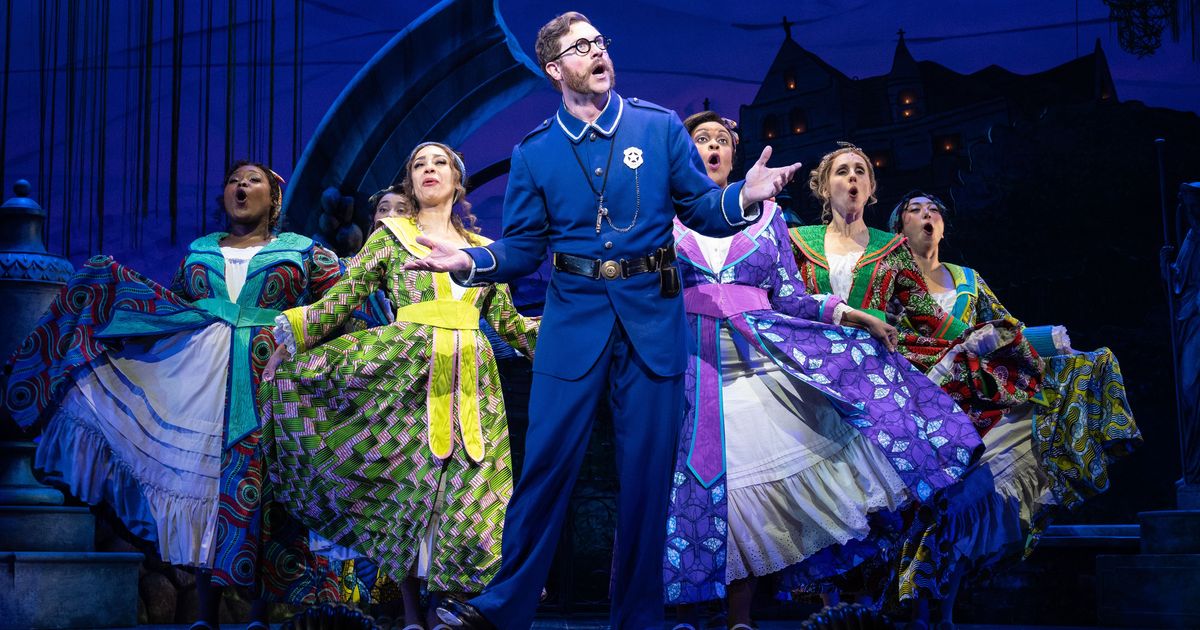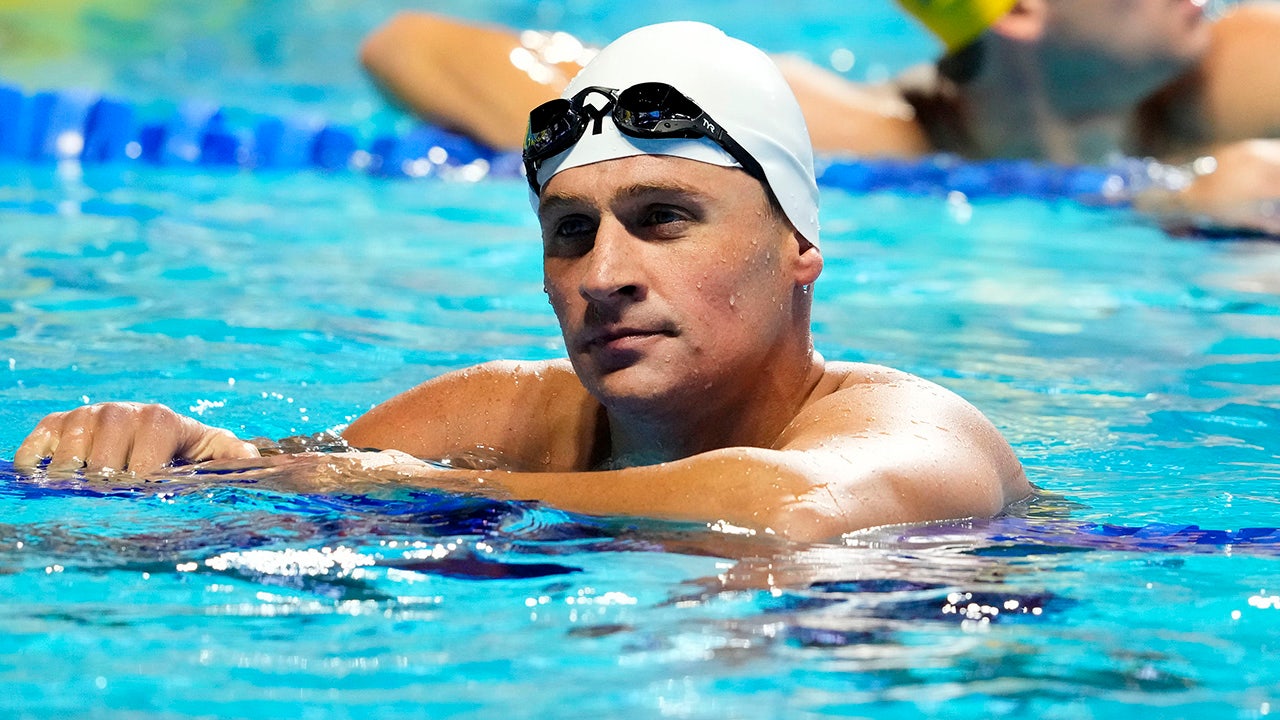The exclamation mark really is the giveaway. In the making of Pirates! The Penzance Musical, an exquisitely funny, meticulously concocted theatrical pavlova—the 1879 operetta The Pirates of Penzance by W. S. Gilbert and Arthur Sullivan—has been whacked with a mallet. Musical nuance and lyrical wit have become, in most cases, broadfaced vaudevillian mugging; anything originally written with a wry wink or a satirical flourish now comes along with the tonal equivalent of a drum sting and jazz hands. Presumably director Scott Ellis and adapter Rupert Holmes wanted to land the show in a long tradition of musicals with shouted titles—from Oklahoma! to Fiorello! to Gutenberg!—and to reassure suspicious audiences of all the fun they’re about to have. Maybe they also wanted to distinguish it from one of the most expensive pornos ever made.
Then there’s that subtitle, which manages to encapsulate the baffling nature of this adaptation’s ambitions. Everything from the show’s marketing to its opening sequence—in which Gilbert and Sullivan themselves, in the persons of David Hyde Pierce and Preston Truman Boyd, make a cameo to walk us through what we’re about to see—drives home in no uncertain terms that this Pirates has been transferred from the rocky coasts of Cornwall to the Big Easy. It’s been reset in late-1800s New Orleans and aggressively reorchestrated (by Joseph Joubert and Daryl Waters) to incorporate strains of jazz, honky-tonk, and zydeco, along with plenty of standard Broadway razzmatazz. Okay, sure — then why call it “The Penzance Musical”? The operetta’s location sneaks into the title the way that the operetta itself manages to sneak into the show: seemingly at random and often in stark contrast to the barrage of new material that purports to spring from it. Every so often, some full-fledged Gilbert and Sullivan sparkles through the Ellis and Holmes, and the effect is instantly galvanizing. There it is — the brilliant thing that’s been buried, the real source of life and energy underneath all the plumping, filling, tucking, and squeezing.
This isn’t to say that The Pirates of Penzance demands reverence. British and Victorian though they were, Gilbert and Sullivan were entirely popular entertainers, Gilbert’s tongue-twisting lyrics crammed with cheeky satire and Sullivan’s criminally singable tunes incorporating burlesques of classical composers from Verdi to Gounod. Keeping such clever adapters of the canon alive with new adaptations is a lively idea, but the results have got to hold up. The original Pirates—which tells the story of the young apprentice Frederic (here played by Nicholas Barasch) as he attempts to leave the buccaneering life to pursue virtue and love, then finds himself snared by wonderfully absurd dilemmas of duty—is a near flawless example of smart-dumb. In busting the thing up to rebuild it, Holmes and Ellis have drained away much of the smart, replacing it with hard nudges to the ribs, tedious hat tips to contemporary sensibilities, and unnecessary lumps of earnest character biography. Why does the Pirate King (Ramin Karimloo) now need to be harboring a painful vendetta on behalf of a father who “died while held captive by the British,” except to give us a dutiful reminder of the complex political histories behind the real pirates of New Orleans and the Caribbean, one that we’re apt to think about for all of three seconds? Meanwhile, as Holmes rejiggers practically every line of the character’s swashbuckling anthem (“I Am the Pirate King”), he manages to drain the song of all its actual politics: “My crew are true and loyal to me / And I’m piratical royalty,” sings Karimloo’s king, along with other banal lyrics about things like “raiding galleons and running rum.” Here, on the other hand, is Gilbert:
Oh, better far to live and die
Under the brave black flag I fly,
Than play a sanctimonious part,
With a pirate head and a pirate heart.
Away to the cheating world go you,
Where pirates all are well-to-do;
But I’ll be true to the song I sing,
And live and die a Pirate King.
The rousing shanty is already a knowing commentary on class and hypocrisy. “No Frederic, it cannot be,” says the original pirate king when his apprentice urges him to give up the sword for “civilization.” “I don’t think much of our profession, but, contrasted with respectability, it is comparatively honest.” There, in one zinger, is more keen humor than can be found in most of Ellis’s production.
For all its hamfistedness, Pirates! isn’t completely charmless. Warren Carlyle’s choreography features some genuinely fun bits with semaphore flags and washboards, and once in every dozen or so, Holmes successfully lands a joke. But much of the show’s appeal can be tracked back to a single performer: At the center of all the flattening contrivance, David Hyde Pierce is shuffling about with his mildly hapless, lovable deadpan, giving the production’s only understated performance. It’s a pleasant discovery that Pierce’s diffident, sleepy-eyed energy works as well as it does for Major-General Stanley, who’s got to rattle off the night’s most famous and comically virtuosic song. (The concept in Pirates! is that after the framing device, Gilbert and Sullivan take roles in their own show, with Pierce’s Gilbert as “the very model of a modern Major-General.”) This General Stanley always seems just a bit surprised, whether it’s to find himself capable of rhyming “more wary at” with “commissariat” or simply to be on stage in the first place. Holmes and Ellis interpolate a few songs from other Gilbert and Sullivan operettas, but most are rendered into duds and Pierce’s moments again prove the exception. Jinkx Monsoon, playing Frederic’s childhood nurse Ruth, gets her hilariously over-the-top duet (“Oh! false one, you have deceiv’d me”) axed in the first act only to be compensated with a particularly cringey version of The Mikado’s “Alone, and Yet Alive” in the second — but Pierce makes genuinely delightful work of “The Nightmare Song,” its fretful patter borrowed from Iolanthe to relaunch the show after intermission.
It’s in that section of the performance, a brief, refreshing stretch that begins Act Two, that Ellis and Holmes either start to lose steam as adapters or perhaps, at last, to place more trust in their source material. For a while—as General Stanley grapples with a troubled conscience and as Frederic and his true love Mabel (Samantha Williams) attempt to rouse the timorous local police against the pirates—the production’s own interventions become less heavy-handed, and the tunefulness and cleverness of its inspiration are able to shine through. Though backed by a superfluous, lightbulb-decked mini-proscenium that flies into the center of David Rockwell’s picture-book set, the bubbling trio by Ruth, Frederic, and the Pirate King called “A Paradox” still conveys all its joyful inanity. Switching from pirates to police, the ensemble delivers Chaplin–esque buffoonery in Carlyle’s tap choreo for “When the Foeman Bares His Steel” (though Boyd, playing Sullivan-as-Police Sergeant, doesn’t leave much of an impression). Later on, the pirates’ kickline-sporting, and, crucially, minimally musically retooled “With Cat-Like Tread” succeeds in shaking the roof.
It also reveals that the reorchestration by Joubert and Walters sits at the heart of Pirates!’s miscalculations. In an attempt to loosen up Sullivan’s music and infuse it with diverse Americana, they’ve flubbed nearly every tempo and tone. Songs that should blaze by are sluggish while tunes that should pine and linger are sped through. Not only does it move the whole score toward a homogenizing middle pace; it also betrays an undermining sense of doubt: Oh, these lyrics are too fast, let’s slow them down so the audience gets them. Oh, this song is too slow, let’s speed it up so the audience won’t be bored. Somewhere on the fundamental level, the show’s team is missing the point and making up their own, which might not grate as much if the substitution weren’t so flimsy. But solid timber has been swapped for balsa wood, and nowhere is it more apparent than in the rewritten finale to Act One. “Hail, Poetry, thou heav’n-born maid!” sings the ensemble at glorious fortissimo in Gilbert and Sullivan’s operetta — and while this thunderous chorus might at first seem hilariously out of the blue, it is in fact the heart of the entire project. “For what, we ask, is life / Without a touch of Poetry in it?” intones the Pirate King. What are we all here for, indulging in this sublime silliness, if not beauty, if not delight, if not poetry? “Hail, Liberty, thou precious flame!” sings Ellis’s ensemble, and something delicate and essential dies. Nebulous American buzzwords replace transcendance, and Pirates! rolls on, content to toss plastic beads in place of pearls.
Pirates! The Penzance Musical is at the Todd Haimes Theatre through July 27.












